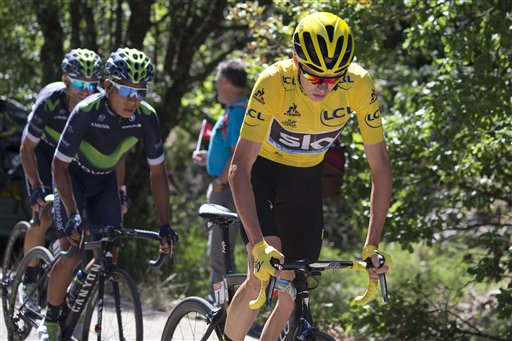
Britain’s Chris Froome, wearing the overall leader’s yellow jersey, is followed by Colombias Nairo Quintana and Spain’s Alejandro Valverde as they climb towards Chalet Reynard during the twelfth stage of the Tour de France cycling race with start in Montpellier and finish six kilometers (3.7 miles) before the Mont Ventoux, France, Thursday, July 14, 2016. AP Photo/Peter Dejong
BERN, Switzerland — As the Tour de France heads toward the Alps, Nairo Quintana and Alejandro Valverde have only a few opportunities left to try and derail Chris Froome’s bid for a third title in four years.
The remaining three high-mountain stages and uphill time trial should be the ideal playground for the Movistar teammates, who need to abandon their conservative approach and take all risks to make up for the big chunk of time they have lost.
Quintana, runner-up to Froome in 2013 and 2015, is in fourth place overall, 2 minutes, 59 seconds behind. Valverde is 18 more seconds behind his teammate.
The gaps are significant, but Quintana, a pure climber from Colombia, managed to gain time on Froome in the Alps last year.
His subdued performance at the Mont Ventoux and his unimpressive time trial last week have, however, raised doubts about his ability to make a comeback.
Even his team manager, Eusebio Unzue, admits Quintana is not at his best.
“We did not see the Nairo we know at the Mont Ventoux. Hopefully, things will return to normal in the Alps,” he said.
Unzue has been vainly scratching his head to find the winning formula that will allow his riders to crack Team Sky’s supremacy. While many observers have been struggling to understand why Quintana and Valverde have not harassed Froome with relentless attacks in the Pyrenees and the Jura mountains, Unzue says his cautious approach was right.
“Attacking all the time would be good for the show. But it’s unrealistic and not a guarantee for success,” Unzue said. “We need to wait for the right time, for the moment that will allow us to be efficient when we make a move.”
Valverde agreed with his boss, saying Quintana “has to try it when he considers he can hurt his competitors.”
Encouraging for Movisar is that Froome has not been as dominant on the mountains as he has on previous Tours.
Froome would normally use the first mountaintop finish to assert his authority on the race, something he has not been able to do this year. Instead, he’s built his lead with an impressive showing against the clock combined with master tactical coups in the Peyresourde downhill and the crosswinds near Montpellier.
“I believe that Froome and his rivals are more or less on the same level in the mountains this year,” Unzue said. “In Andorra and at the Ventoux, he did not attack to create gaps, I believe that he is not as strong as he was before. The problem is more that he has a team capable of controlling the race in delicate situations.”
Despite claims in French newspapers that Froome has no rival this year, he is certain he will be given a hard challenge in the Alps, where he struggled with a chest infection and lost nearly two minutes to Quintana last year. As a result, he has slightly changed his preparation to be in a better shape in the final week of racing.
“I feel more ready for the third week than I have been previously,” said Froome, who has a 1:47 lead over his closest rival, Dutch rider Bauke Mollema. “Starting the season later helped, and I had a quieter run-in to the Tour. I said at the beginning of the race I wanted to be at my best in the third week and I’m on track for that.”
Wednesday’s first Alpine stage takes the peloton on a 184.5-kilometer ride to the ski resort of Finhaut-Emosson, and features a punishing 10-kilometer final climb to the finish. It will be followed by an uphill time trial and two more grueling stages in high altitude before the ceremonial finish on the Champs Elysees.
“I feel as if I’ve been waiting for these four days,” Froome said. “Perhaps some other riders have, too.”